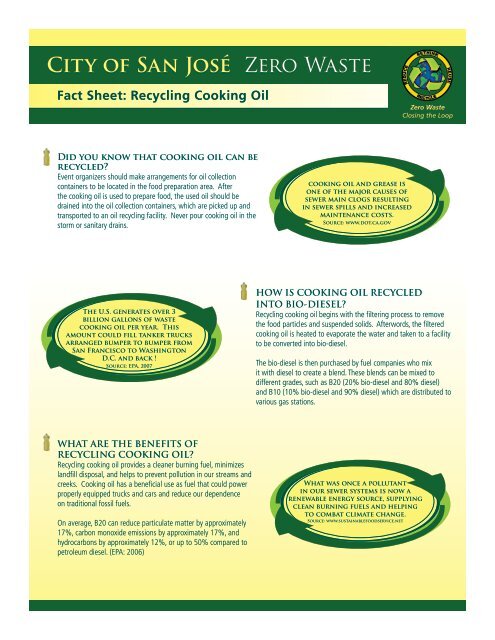Fact Sheet: Recycling Cooking Oil - San Jose Recycles
Fact Sheet: Recycling Cooking Oil - San Jose Recycles
Fact Sheet: Recycling Cooking Oil - San Jose Recycles
You also want an ePaper? Increase the reach of your titles
YUMPU automatically turns print PDFs into web optimized ePapers that Google loves.
City of <strong>San</strong> José Zero Waste<br />
<strong>Fact</strong> <strong>Sheet</strong>: <strong>Recycling</strong> <strong>Cooking</strong> <strong>Oil</strong><br />
Did you know that cooking oil can be<br />
recycled?<br />
Event organizers should make arrangements for oil collection<br />
containers to be located in the food preparation area. After<br />
the cooking oil is used to prepare food, the used oil should be<br />
drained into the oil collection containers, which are picked up and<br />
transported to an oil recycling facility. Never pour cooking oil in the<br />
storm or sanitary drains.<br />
The U.S. generates over 3<br />
billion gallons of waste<br />
cooking oil per year. This<br />
amount could fill tanker trucks<br />
arranged bumper to bumper from<br />
<strong>San</strong> Francisco to Washington<br />
D.C. and back !<br />
Source: EPA, 2007<br />
WHAT ARE THE BENEFITS OF<br />
RECYCLING COOKING OIL?<br />
<strong>Recycling</strong> cooking oil provides a cleaner burning fuel, minimizes<br />
landfill disposal, and helps to prevent pollution in our streams and<br />
creeks. <strong>Cooking</strong> oil has a beneficial use as fuel that could power<br />
properly equipped trucks and cars and reduce our dependence<br />
on traditional fossil fuels.<br />
On average, B20 can reduce particulate matter by approximately<br />
17%, carbon monoxide emissions by approximately 17%, and<br />
hydrocarbons by approximately 12%, or up to 50% compared to<br />
petroleum diesel. (EPA: 2006)<br />
cooking oil and grease is<br />
one of the major causes of<br />
sewer main clogs resulting<br />
in sewer spills and increased<br />
maintenance costs.<br />
Source: www.dot.ca.gov<br />
Zero Waste<br />
Closing the Loop<br />
HOW IS COOKING OIL RECYCLED<br />
INTO BIO-DIESEL?<br />
<strong>Recycling</strong> cooking oil begins with the filtering process to remove<br />
the food particles and suspended solids. Afterwords, the filtered<br />
cooking oil is heated to evaporate the water and taken to a facility<br />
to be converted into bio-diesel.<br />
The bio-diesel is then purchased by fuel companies who mix<br />
it with diesel to create a blend. These blends can be mixed to<br />
different grades, such as B20 (20% bio-diesel and 80% diesel)<br />
and B10 (10% bio-diesel and 90% diesel) which are distributed to<br />
various gas stations.<br />
What was once a pollutant<br />
in our sewer systems is now a<br />
renewable energy source, supplying<br />
clean burning fuels and helping<br />
to combat climate change.<br />
Source: www.sustainablefoodservice.net
<strong>Fact</strong> <strong>Sheet</strong>: The Life Cycle of <strong>Cooking</strong> <strong>Oil</strong><br />
Visit www.sjrecycles.org/events-venues/ for tips on how to collect and recycle cooking oil at your event.<br />
Bio-Diesel is purchased to<br />
fuel trucks that transport<br />
products to stores.<br />
The blends are<br />
distributed to gas<br />
stations.<br />
Companies purchase<br />
bio-diesel to create<br />
different blends (biodiesel<br />
and diesel<br />
blended together).<br />
Recycled oil is brought<br />
to a facility to be<br />
processed into<br />
bio-diesel.<br />
Start Here►<br />
<strong>Cooking</strong> oil is used<br />
to prepare food during a<br />
special event.<br />
In Accordance with the Americans with Disabilities Act, City of <strong>San</strong> José<br />
Environmental Services Department materials can be made available upon<br />
request in alternative formats, such as braille, large print, audio-tape or<br />
computer disk. Requests may be made by calling<br />
(408) 535-8550 (voice) or (800) 735-2929 (CRS).<br />
Used cooking oil is<br />
drained into special<br />
collection containers at<br />
the close of the day<br />
and/or event.<br />
Recyclers pick up<br />
and recycle the oil at<br />
their facility.<br />
The used cooking oil is<br />
filtered to remove<br />
food particles and heated<br />
to remove water.<br />
200 East <strong>San</strong>ta Clara Street, 10th Floor <strong>San</strong> José, CA 95113 tel (408) 535-8550 fax (408) 292-6211


